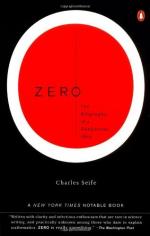
|
| Name: _________________________ | Period: ___________________ |
This quiz consists of 5 multiple choice and 5 short answer questions through Chapter 5.
Multiple Choice Questions
1. Where does the author say early medieval Jews took up residence and discovered that Aristotle’s aversion to zero contradicted Jewish theology in Chapter 3, “Nothing Ventured”?
(a) Ancient Egypt.
(b) Muslim Spain.
(c) South America.
(d) Rome.
2. Bishop Berkeley was a philosopher whose primary achievement was the advancement of a theory he called what?
(a) “The Golden Ratio.”
(b) "Immaterialism."
(c) “String theory.”
(d) “Calculus.”
3. What refers to a system of tribunals developed by the Holy See of the Roman Catholic Church during the second half of the 16th Century?
(a) The Roman Inquisition.
(b) The Medieval Inquisition.
(c) The Spanish Inquisition.
(d) The Catalina Inquisition.
4. The system that equipped the USS Yorktown in 1996 and 1997 was predicted to save $2.8 million per year by reducing the ship’s complement by what percentage?
(a) 5%.
(b) 20%.
(c) 30%.
(d) 10%.
5. When was Jean le Rond d'Alembert born?
(a) 1717.
(b) 1811.
(c) 1659.
(d) 1701.
Short Answer Questions
1. What rule in calculus uses derivatives to help evaluate limits involving indeterminate forms?
2. What work by Muhammad ibn Ahmad al-Khwarizmi presented the first systematic solution of linear and quadratic equations in Arabic?
3. Pythagoreanism developed into two separate schools of thought. What group was called “the listeners” in Greek?
4. The ancient Babylonians are credited with the creation of what calculation tool?
5. When did René Descartes live?
|
This section contains 245 words (approx. 1 page at 300 words per page) |

|




